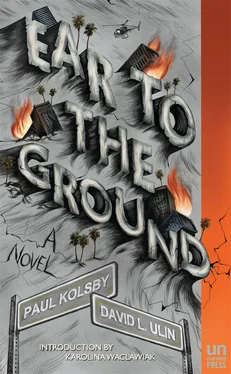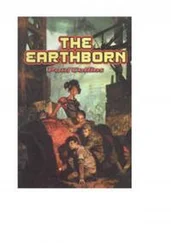“Yeah, why?” Dorothy chimed in.
“Go on out if you wanna go out!” Henry snapped.
When Green Bay marched down the field to make it 21-0, and the 49er faithful began booing their team, Henry knew it was too late. He threw the remote control at the television screen, smashing it into a dozen pieces.
“What’s wrong with you, Henry?” Emma yelled. “It’s only a game!”
And, trying unsuccessfully to clear his throat as her words echoed in his ears, Henry readied himself for a life of desperation and pain.
STERLING CARUTHERS GOT INTO HIS CAR AND SAT FOR A moment. He looked through the windshield, the way people do when they’re not thinking about anything specific, or really anything at all. He was staring at the hedges that separated his Laurel Canyon home from that of his neighbor, a man who played catcher for the Dodgers, and with whom, until recently, he was on friendly terms.
Caruthers backed carefully out of his driveway, ran a stop sign at the bottom of his street, and six minutes later was moving northwest in medium traffic on the 101. It was not yet seven a.m., and he consoled himself with the knowledge that the sun was tormenting drivers in the opposite direction. The weather was fair, but the San Fernando Valley was bleak somehow, crawling with cars like maggots on a mango. If he craned his neck, Caruthers could see Warner Brothers, with its soundstages, its bungalows, its trailers and little golf carts, that dreadful commissary, and those corporate offices where he’d been lattéd and seltzered endlessly. He’d like to blow the whole studio up. Maybe he’d get away in time and maybe not. What did it matter, anyway?
As he passed the exit for Calabasas, which he’d taken too often to go to the home of his ex-wife’s parents, he wondered if the force of the Warner explosion would take care of them, too. The whole family had turned on him when they’d learned of one of his extramarital affairs. A minor indiscretion: It had been meaningless, drunken, nothing compared with his love for Emily.
Still, it had gone on for more than a year. Those same in-laws had been so warm before — he often enjoyed golf with Emily’s father, who called him “Ster,” or sometimes “son.”
“Two birds with one bomb,” he thought, enamored of the phrase. Then he realized a bomb in Burbank would never blow in Calabasas. Caruthers recognized a pattern: They’d abandoned him, like everybody did. Two wives had left him, a poor one he loved and a rich one he didn’t. He regretted losing them both. He tried to remember their faces, but could only remember photographs of their faces. Though his second wife wore Chanel, he could conjure only the idea, and not the smell of the perfume. He remembered the dress — black polka-dots on white — one of his mistresses wore like a bathrobe, after they’d had sex. Made love. He couldn’t imagine her wearing the dress; he could only see it hanging there, up on the end of a door.
The fuel reserve light had been on for fifteen minutes, so Caruthers pulled his 1967 Rolls-Royce Corniche convertible into a Texaco station just off the freeway, and surprised the attendant at the Full Service pumps by asking for only five dollars’ worth of regular.
“Check under the hood?”
“No,” he told the grease-covered man. “The oil is fine.”
He got back on the 101 and reached the place where buildings ended and those sprawling cypress trees seemed tiny on the hilltops. He took the Los Virgenes exit and eventually reached Malibu Canyon Road.
The sight of red rock all around him was awesome; the massive slabs sprawled underneath as he climbed the final straightaway through the mountains. Soon, like a flash, that two-mile canyon stretch would afford him his first glorious sight of the Pacific Ocean, only to yank it away like a bullfighter’s cape as the car rounded another curve. Caruthers thought how life did that: dangle fruit so you could smell its ripeness, then snatch it away.
No good lawyer would represent him, and prosecutors had even discussed charging him with treason. The Center for Earthquake Studies was finished, padlocked, under investigation. It had been a good idea, Caruthers thought. It had almost worked.
It’s not too difficult to lose control of a car if that’s what you’re after. Caruthers had read it in a book: At a fairly high speed, with an automatic transmission, simply shift into “Neutral” and then jam it into “Reverse.” The gears won’t catch, but they’ll almost certainly jam, and the car will change speed at a rate so unpredictable that you’re sure to do something strange to compensate. In Caruthers’s case, the car veered sharply to the right. To compensate he turned left, but too far left. At eighty miles per hour, this sent him easily through the guardrail, and the convertible went sailing through the air. If you were close by in Malibu Canyon early that morning, you’d have thought that his car would fly.
Caruthers’s last thought interested him: Life is a takeoff and a landing, with turbulence in between. Two seconds later, the car crashed — headlights first, and rolled once, end over end. Then, instead of exploding, the five dollars’ worth of regular began to burn very slowly.
GRACE GONGLEWSKI HAD NEVER HIRED A MOVING company before. All her college moves, along with the one across the country, had been of the lug-it-yourself variety: truck rental, hunting for empty boxes, and friends who could be lured by pizza and beer.
This time, however, she and Charlie decided to relax and splurge. She’d made goodbye calls to three people; the others — that slew of acquaintances she’d acquired during four years in L.A. — could simply dial the Arizona number on the recording Pac Bell said they’d keep on her old number for ninety days.
Charlie hated moving. He couldn’t stand the sight of movers bumping his delicate machines into the walls. Especially the lumino-oscilloscope, a one-of-a-kind device that measured minute thermal shifts in certain magna and strata. On moving days he always wished he were a blues singer, with nothing but the shirt on his back, able to walk into any bar, anywhere, and sing so well the owner would come out with a plate of steaming food, a glass of good red wine, and a key to the room upstairs. Charlie had moved many times, but this time things were different.
Their first fight had been about Charlie staying nearly every night at Grace’s apartment, and how he’d come, unconsciously, to resent it. Grace told him she was more than happy to stay at his place, but four days later they were both sick of the spartan, bachelor-y way Charlie had arranged his possessions. Finally, they decided to find a place together. This conclusion, along with certain others, was reached over a romantic meal at Cafe des Artistes, where Grace had ordered a second bottle of wine because — though you could never know what was going to happen — it was still possible to look across a table and think you were seeing the rest of your life. For a moment, while she smiled into Charlie’s eyes, a reddish light radiated behind his head and the rest of the room went dark.
On their last night in Los Angeles, they made love on the carpet of her bedroom. The apartment was empty, hollow, and their voices ricocheted strangely through the rooms. They might have stayed in the living room — after all, the bed had been taken away — but they’d come to the bedroom almost by rote, or by fate, and they laughed when they realized this.
They awoke simultaneously in each other’s arms; they showered together and, two distinct eloquences of economy, they finished their last-minute tasks with unprecedented swiftness.
Читать дальше












